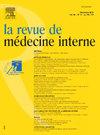IA en santé : guide pour l’interniste averti
IF 0.9
4区 医学
Q3 MEDICINE, GENERAL & INTERNAL
引用次数: 0
Abstract
Artificial intelligence (AI) is experiencing considerable growth in medicine, driven by the explosion of available biomedical data and the emergence of new algorithmic architectures. Applications are rapidly multiplying, from diagnostic assistance to disease progression prediction, paving the way for more personalized medicine. The recent advent of large language models, such as ChatGPT, has particularly interested the medical community, thanks to their ease of use, but also raised questions about their reliability in medical contexts. This review presents the fundamental concepts of medical AI, specifically distinguishing traditional discriminative approaches from new generative models. We detail the different exploitable data sources and methodological pitfalls to avoid during the development of these tools. Finally, we address the practical and ethical implications of this technological revolution, emphasizing the importance of the medical community's appropriation of these tools.
[医疗保健中的人工智能:内科医生的生存指南]。
在可用生物医学数据激增和新算法架构出现的推动下,人工智能(AI)在医学领域正经历着可观的增长。从辅助诊断到疾病进展预测,人工智能的应用正在迅速倍增,为更加个性化的医疗铺平了道路。最近出现的大型语言模型(如 ChatGPT)因其易于使用而引起了医学界的极大兴趣,但同时也引发了人们对其在医疗环境中的可靠性的质疑。本综述将介绍医学人工智能的基本概念,特别是区分传统的判别方法和新的生成模型。我们详细介绍了不同的可利用数据源以及在开发这些工具时应避免的方法论陷阱。最后,我们探讨了这场技术革命的实践和伦理意义,强调了医学界使用这些工具的重要性。
本文章由计算机程序翻译,如有差异,请以英文原文为准。
求助全文
约1分钟内获得全文
求助全文
来源期刊

Revue De Medecine Interne
医学-医学:内科
CiteScore
0.70
自引率
11.10%
发文量
526
审稿时长
37 days
期刊介绍:
Official journal of the SNFMI, La revue de medecine interne is indexed in the most prestigious databases. It is the most efficient French language journal available for internal medicine specialists who want to expand their knowledge and skills beyond their own discipline. It is also the main French language international medium for French research works. The journal publishes each month editorials, original articles, review articles, short communications, etc. These articles address the fundamental and innumerable facets of internal medicine, spanning all medical specialties. Manuscripts may be submitted in French or in English.
La revue de medecine interne also includes additional issues publishing the proceedings of the two annual French meetings of internal medicine (June and December), as well as thematic issues.
 求助内容:
求助内容: 应助结果提醒方式:
应助结果提醒方式:


